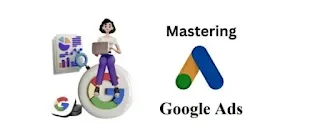Explore how Google Ads continues to lead digital marketing in 2025 with smart tools, rebranding insights, and unmatched advertising reach.
🖋 By Meenakshi – AZAD Architects, Barnala
Why Google Ads Still Dominates Digital Marketing in 2025.
Google Ads remains one of the most powerful digital advertising platforms in 2025. With unmatched reach, precision targeting, and advanced tools, it empowers businesses of all sizes to reach the right customers at the right time.
In 2025, Google Ads
continues to dominate digital advertising for one main reason: its
unmatched versatility and precision. Businesses—from startups to Fortune
500 companies—leverage it to target users on Google Search, YouTube,
Gmail, and over 2 million partner websites through the Google Display
Network.
What sets Google Ads apart is its data-driven optimization
capabilities, which allow advertisers to reach users at every stage of
the customer journey. Whether you are raising brand awareness, driving
site traffic, or increasing conversions, Google Ads offers tools for
real-time analytics, smart bidding strategies, and AI-powered campaign
automation.
Additionally, Google Ads integrates seamlessly with tools
like Google Analytics, Merchant Center, and YouTube Studio, making it a
centralized hub for performance-driven marketing. It supports both B2B
and B2C industries with advanced audience segmentation, custom intent
audiences, remarketing lists, and dynamic ad formats.
Simply put, if you are advertising online in 2025, ignoring Google Ads is a missed opportunity for scalable growth.
What is Google Ads? – A Beginner's Guide
Google
Ads is Google's online advertising platform, allowing businesses and
marketers to display ads across a variety of Google-owned and partner
properties, such as Google Search, YouTube, the Google Display Network,
Google Maps, and Gmail. Formerly known as Google AdWords, the platform
was rebranded to better reflect its multi-channel capabilities.
With
Google Ads, advertisers bid on keywords and create targeted campaigns to
reach users searching for specific products, services, or information.
You can create ads that appear above organic search results or as video
ads on YouTube, image ads on websites, or even within mobile apps.
The
platform supports several campaign types including Search, Display,
Video, Shopping, and App campaigns. Google Ads is known for its
Pay-Per-Click (PPC) model, meaning advertisers only pay when users
interact with their ads.
Whether you are just starting out or scaling a large digital marketing operation, Google Ads offers granular control and robust tools to measure performance, making it one of the most effective and popular platforms for online advertising in 2025.
Difference Between Google Ads and Googleads – Clarifying the Terms
"Google
Ads" is the official and correct branding used by Google for its online
advertising platform. Occasionally, you will see people use the term
"Googleads" (without a space), but this is simply an informal or
mistaken variation commonly found in search queries or online forums.
The
correct usage—Google Ads—represents a unified platform for Search,
Display, Shopping, App, and Video advertising. Using the right
terminology helps ensure clarity and professionalism, especially when
communicating with clients, teams, or support services.
If you are searching for help or resources online, it is always best to use the official spelling to get the most accurate and relevant results.
AdWords vs. Google Ads – Why the Name Changed and What It Means for You
In
July 2018, Google officially retired the name "AdWords" and introduced
the new branding: Google Ads. This rebranding was not just cosmetic—it
signified the platform's evolution from a simple keyword-based ad
service into a full-scale digital advertising ecosystem.
Originally
launched in 2000, AdWords focused primarily on text-based search
advertising. Over time, however, Google's advertising network expanded
to include display ads, YouTube video ads, app promotion, and shopping
ads. The name "AdWords" no longer reflected the platform's comprehensive
capabilities.
The new name—Google Ads—better represents its diverse
formats and wide reach across the entire Google ecosystem, including the
Search Network, Display Network, YouTube, and the Google Play Store.
What
does this mean for advertisers today? It means you have a streamlined
interface, more automation tools, and access to Smart Campaigns, which
are powered by Google's machine learning. If you are still thinking in
terms of "AdWords," it is time to update your strategy and terminology
for 2025.
#GoogleAds #AdWords #DigitalMarketing #OnlineAdvertising #PPCMarketing #GoogleMarketing #MarketingStrategy #AdTech #GoogleAnalytics
📌 Thank you!
Follow Finance (Azad Architects, Barnala) for practical tips from an architect, blogger, technical expert, and financer's lens.
#FinanceAzadArchitectsBarnala #AZADArchitects









